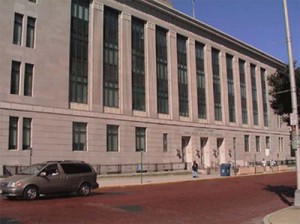Constitution
Health care reform bill: another appeal

A little-known case against the health care reform bill, now at the Third Circuit, could have much further-reaching effects.
Where does the case now stand?

The Clarkson S. Fischer Federal Building in Trenton, NJ. It houses the US District Court for New Jersey, where a little-known case against the health care refom bill was decided. Photo: US Pretrial Services Agency, New Jersey District
The case, Purpura et al. v. Sebelius et al., is the only case of its kind against the federal health care reform bill (HR 3590). The two lead plaintiffs, Nicholas E. Purpura and Donald R. Laster, filed their case pro se—without hiring lawyers. They listed fifteen different reasons why the health care reform bill violates the Constitution, and their constitutional rights.
In April, Judge Freda L. Wolfson of the US District Court for New Jersey dismissed the complaint. She said that the two did not have standing to sue the government. She took the government’s word that Purpura and Laster had not shown how the health care reform bill would hurt them.
The two have now appealed to the Third Circuit Court of Appeals. The circuit will now name three of its judges to handle the appeal.
How did the case get to this point?
Purpura and Laster filed their case in September of 2010. Almost at once they sought a temporary restraining order (TRO) to stop the federal government from enforcing the health care reform bill. The court refused. Then the two plaintiffs, one of whom has appeared before in front of Judge Wolfson, asked her to take herself off the case and assign it to another judge. She refused that also.
Sixty days passed after the plaintiffs filed their complaint. The government did not answer the complaint, as the Federal Rules of Civil Procedure say they must. So on December 9, 2010, Purpura and Laster filed a motion for a default judgment. The court scheduled a hearing on that motion, but then delayed the hearing after the government pleaded for more time. The government then filed its own motion to stay any summary-judgment proceedings.
The only arguments that the government could use by then were:
- Purpura and Laster had no standing to sue, or
- Purpura and Laster failed to serve their complaint on the United States Attorney for New Jersey.
The two plaintiffs did serve their complaint on the Secretaries of Health & Human Services, Treasury, and Labor. They should have walked down to US Attorney Paul Fishman’s office, a few floors down from the District Court offices, and handed them a copy of the complaint. They did not. But: Fishman added his name to a response to the motion for the TRO. In fact, Fishman put his name on five separate pieces of correspondence about this case. Fishman’s office also gave Purpura a verbal assurance that all that Purpura had to do was send over a hard copy of the complaint, and they wouldn’t make an issue of “insufficient service of process.”
Rule 12 of the FRCP says that a defendant can raise lack of subject-matter jurisdiction (including lack of standing) at any time. But they must raise insufficient service of process within the 60 days. And if they correspond in writing about the case, they cannot claim that they did not know that someone was suing them.
In any case, the government is not contesting insufficient service. They put all their effort into raising the no-standing issue.
What is wrong with the health care reform bill?
Purpura and Laster name fifteen “counts” against the health care reform bill:
- It came out of the US Senate, not the US House of Representatives, this although it has new taxes and fees in it.
- Its “Minimal Coverage Mandate” goes beyond regulating interstate commerce.
- It “raises and supports” an “army” (the Ready Reserve Corps) and appropriates funds for that “army” for four years. The Constitutional limit is two.
- It raises a head tax without apportioning it among the States.
- It taxes the exports of some States but not others. (A medical device, sold across State lines, is an export.)
- Obama had no business signing the health care reform bill, because he is not a natural born citizen.
- It double-taxes some income, and taxes other income that does not exist.
- An inspector general might seize a patient’s “electronic medical record” without a warrant to run down a complaint that someone was gaming the system.
- The “Minimum Coverage Mandate” deprives people of property (the money they must spend) without due process of law, and even makes “involuntary servants” of them.
- It tells the States to deprive people living in them of their property without due process of law.
- It establishes favored religions, by exempting the adherents of some of them from the Mandate.
- It actually forbids judicial review of some of its own provisions.
- It discriminates among races, by taxing some goods and services (like tanning beds and salons) that only members of certain races would ever use.
- It makes Congress a party to a violation of their oath to support the Constitution.
- It gives the federal government certain powers that the Constitution does not grant to it. Those powers belong to the States according to the Tenth Amendment.
Why does the government say that the plaintiffs don’t have standing?
The government said that Purpura and Laster had not supplied enough financial and other information to help the judge find how the health care reform bill would hurt them. The Minimum Coverage Mandate affects different people differently. Some people would get a subsidy to help pay for it; others would have health insurance anyway through their job. (That might not be true anymore! A recent study by the McKinsey group said that three in ten employers might drop coverage and pay the fine for not carrying it.) The court further said that the plaintiffs must show that they reorganized their finances to pay either the premium or the fine—or tax. (The government can’t make up its mind whether the penalty for not getting insurance is a fine or a tax.)
Actually, Laster did say that he was handicapped, and needed certain medical devices (wheelchair, crutches, etc.), and the health care reform bill would tax these items. The court said:
Not only are these facts unspecific, they are also entirely conjectural and hypothetical and, therefore, insufficient to confer standing…
Is the court right about that?
The court has caused itself two problems. One, a plaintiff shouldn’t have to wait for a new law to take effect to claim harm from it, if he can see the harm coming. Two, the government has set itself up for a discrimination claim. The Constitution says,
No bill of attainder or ex post facto law shall be passed.
Any law that affects some citizens or lawful residents but not others, strictly by reason of the money they make or don’t make, is a bill of attainder.
In any event, Purpura and Laster stand on their First Amendment right to:
petition their government for redress of grievances.
The court, by denying them standing, denies them that right.
What game(s) might the court be playing?
Purpura has wondered aloud to your editor about that many times. He points out that the government did file a clumsy “motion to dismiss” back in February. But the government addressed only nine of the fifteen counts against the health care reform bill. It said nothing in specific answer to the other six. One of those six counts is Count 6, alleging that Obama is not a natural born citizen as the Founders understood the term. Your editor has found several Supreme Court precedents that support the view of a natural born citizen that Emmerich de Vattel (The Law of Nations) laid out. He says that a natural born citizen is any person:
- Born in-country, and
- Born to two citizen parents, or at least to a citizen father.
Barack H. Obama II had a British colonial subject father, not a US citizen father. (This is why your editor has not followed the “birth certificate” argument. That means nothing unless and until someone deals with the parentage question.) And furthermore: Obama might have renounced his citizenship by moving to Indonesia, getting into a government school there, and paying tuition at the low rate that Indonesian citizens pay.
[amazon_carousel widget_type=”ASINList” width=”500″ height=”250″ title=”” market_place=”US” shuffle_products=”True” show_border=”False” asin=”B00375LOEG, 0451947673, 0800733940, 0062073303, 1595230734, 1936218003, 0981559662, 1935071874, 1932172378″ /]
So where does the case go from here?
The Third Circuit Court of Appeals will name a three-judge panel to review the case. If it affirms the dismissal, Purpura and Laster vow to petition for certiorari to the US Supreme Court. Another case is already at the circuit-court stage: Florida et al. v. Sebelius, the 26-State mega-lawsuit alleging that Congress overstepped the Commerce Clause. The Eleventh Circuit’s three-judge panel recently heard the case on oral argument. Whichever way the Eleventh Circuit decides, that case will go to the Supreme Court, as both sides have vowed.
Purpura and Laster have not even gotten to oral argument with their case. That’s one thing they want, before any court that will give them one. They also believe that they have the most comprehensive of all the cases against the health care reform bill. Certainly it makes the greatest number of arguments against it. And one argument, if it holds, could bring down a Presidency.
Featured image: the Constitution of the United States. Photo: National Archives.
Terry A. Hurlbut has been a student of politics, philosophy, and science for more than 35 years. He is a graduate of Yale College and has served as a physician-level laboratory administrator in a 250-bed community hospital. He also is a serious student of the Bible, is conversant in its two primary original languages, and has followed the creation-science movement closely since 1993.
-

 Accountability2 days ago
Accountability2 days agoWaste of the Day: Principal Bought Lobster with School Funds
-

 Constitution2 days ago
Constitution2 days agoTrump, Canada, and the Constitutional Problem Beneath the Bridge
-

 Executive17 hours ago
Executive17 hours agoHow Relaxed COVID-Era Rules Fueled Minnesota’s Biggest Scam
-

 Civilization17 hours ago
Civilization17 hours agoThe End of Purple States and Competitive Districts
-

 Civilization4 days ago
Civilization4 days agoThe devil is in the details
-

 Executive4 days ago
Executive4 days agoTwo New Books Bash Covid Failures
-

 Civilization3 days ago
Civilization3 days agoThe Conundrum of President Donald J. Trump
-

 Executive4 days ago
Executive4 days agoThe Israeli Lesson Democrats Ignore at Their Peril







[…] now and again, it’s worth looking at the worst of the worst of the healthcare suits. And Purpura v. Sebelius is definitely that. The linked page explains it’s a combination birther/tenther suit — […]
[…] link to cnav.news… […]
[…] New Jersey District Court has ruled that Purpura and Laster do not have standing to sue. The two have appealed to the Third Circuit Court of Appeals. According to federal court rules, an appeal […]
Obama care is one of the biggest boondogles ever perpetulated on the American people King O,Queen Nancy and senile Harry shoud be thrown in prison for running a scam
[…] and Laster appealed to the Third Circuit. Almost at once the Justice Department asked for more time to file their […]
[…] Apr 21, 2011, a U.S. District Court decider dismissed a case, observant that a plaintiffs did not have subject matter jurisdiction, quoting a prior […]
[…] April 21, 2011, a U.S. District Court judge dismissed the case, stating that the plaintiffs did not have subject matter jurisdiction, quoting a previous […]
[…] Another appeal […]